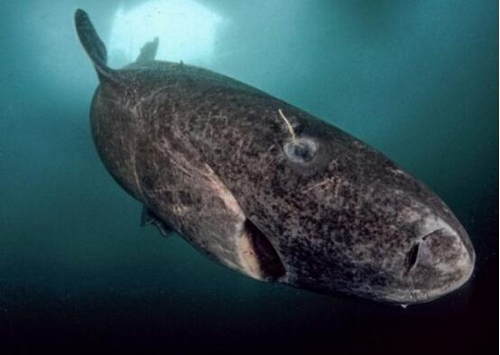(单词翻译:单击)
听力文本
This is Scientific American — 60-Second Science. I'm Cynthia Graber.
By human standards, a few vertebrate species have incredible longevity. Some tortoises live for nearly 200 years. Bowhead whales can live even a decade or two longer. But now there's a new champion: the Greenland shark—which conservative estimates have swimming in the seas for almost three centuries.
Julius Nielsen is a marine biologist and PhD student at the University of Copenhagen. While on a research vessel in Greenland where such sharks were accidentally caught, Nielsen became curious about the creatures.
"And perhaps the biggest of all the mysteries were how long do these sharks actually live. Because it has been expected that they can get very old, and that's based on some observations of very, very slow growth...so the longevity could be exceptional and extreme, but it has just never been possible to investigate."
That's because Greenland sharks don't have the same body structures used for gauging the age of most fish or even other sharks. So Neilsen and colleagues used a new technique based on the lens of the eye. The centers of the lenses can be analyzed by radiocarbon dating to determine about when the shark was born. They tested 28 female sharks.

"And what we found was that the biggest shark in our analysis, and also the oldest shark, was estimated—the most likely single year age was almost approximately 390 years."
Nielsen stresses that the estimate contains a fair amount of uncertainty. Though the likeliest age is 390, the shark could be as young as a mere 272. "That still makes the Greenland shark the longest-living vertebrate known to science." And at the upper limit, it's possible that the shark is more than 500 years old. The study is in the journal Science.
Also shocking: the researchers estimate that the sharks live at least a century before they reach sexual maturity. "And of course it is absolutely amazing and difficult for a human mind to understand that sexual reproduction begins so late in life."
In the paper Nielsen and his colleagues stress the importance of caution and conservation. "And the thing about Greenland sharks is just we don't know how many sharks are out there. But it's clear that if you reach sexual maturity above 100 years then you are potentially sensitive to any kind of high bycatch rate and any kind of future commercial exploitations."
With a century to do it, humans could inadvertently wipe out the entire next generation of these sharks during their long, slow adolescence.
Thanks for listening for Scientific American — 60-Second Science Science. I'm Cynthia Graber.
参考译文
这里是科学美国人——60秒科学。我是辛西娅·格雷伯。
按照人类的标准,有一些脊椎动物的寿命长得令人难以置信。有些海龟活了将近200年。弓头鲸甚至可以比海龟多活一二十年。但是现在人们发现了新的长寿王:格陵兰鲨鱼,据保守估计,它们已经在海里生活了将近3个世纪。
尤利乌斯·尼尔森是海洋生物学家兼哥本哈根大学博士生。格陵兰岛的一艘考察船意外捕获了一些鲨鱼,尼尔森开始对这个生物感到好奇。
“可能最大的谜团是格陵兰鲨鱼到底能活多长时间。观察格陵兰鲨鱼后发现,它们生长的速度非常非常缓慢,不过它们也会变老,所以它们的长寿现象可能是非常罕见的,但是此前却一直未能进行研究。”
这是因为格陵兰鲨鱼不具备大多数鱼类甚至其他鲨鱼可以测量年龄的身体结构。所以尼尔森和同事采用了一项以眼睛晶状体为基础的新技术。可以通过放射性碳分析镜片的中心,来决定鲨鱼出生的时间。研究人员检测了28头雌性鲨鱼。
“我们发现,研究中最大的鲨鱼,同时也是最年长的鲨鱼,其年龄约为390岁。”
尼尔森强调称,这种预测包含很多不确定性。尽管这只鲨鱼最有可能的年龄是390岁,但它可能只有272岁。“尽管如此,格陵兰鲨鱼仍是迄今为止科学界发现的最为长寿的脊椎动物。”若往年长估计,该鲨鱼可能已经500多岁了。该研究结果发表在《科学》杂志上。
同样令人震惊的是:研究人员估计格陵兰鲨鱼至少要到100岁才能达到性成熟。“当然对人类来说这绝对是相当惊人的,人类思维很难理解有性繁殖开始的这么晚。”
尼尔森和同事在文章中强调了关心和保护格陵兰鲨鱼的重要性。“有关格陵兰鲨鱼我们不知道的是世上有多少这种鲨鱼。但是很显然,如果在100岁以后才能达到性成熟 ,那么其对高捕捉率和未来商业开发都是非常敏感的。”
因为需要一个世纪的时间,在格陵兰鲨鱼漫长而缓慢的青春期内,人类可能一不小心就会毁灭格陵兰鲨鱼的下一代。
谢谢大家收听科学美国人——60秒科学。我是我是辛西娅·格雷伯。
译文为可可英语翻译,未经授权请勿转载!
重点讲解
重点讲解:
1. be based on 以…为基础;
例句:That opera is based on an actual occurrence.
那部歌剧是根据真实的故事编写的。
2. at least (数量)至少,不少于;
例句:At least 500 people attended the conference.
至少500人参加了这个会议。
3. be sensitive to 过敏的;易受影响的;敏感的;
例句:His pallid skin was sensitive to the glaring sun.
他苍白的皮肤对耀眼的阳光很敏感。
4. wipe out 摧毁;毁灭;使灭绝;
例句:The disease threatens to wipe out the entire population.
这种疾病有可能毁灭整个种群。


